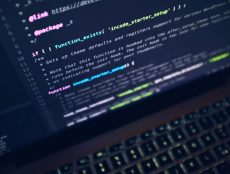
Editor’s Picks
Industry News
New Study Finds that Undergraduates Crave More Online Learning
By Cait Etherington
November 24, 2017
There were no major surprises in Educause’s 2017 ECAR Study of Undergraduate Students and Information Technology. For four years running, the number of students preferring a blended learning environment that includes “some to mostly online components” has increased and those preferring a face-to-face only learning environment has continued to decline. The report did find, however, that tablets, which were gaining popularity a few years ago, are now on their way out as a device of preference.
In 2017, 43,559 students from 124 institutions in 10 countries and 40 U.S. states participated in the ECAR survey. The findings were compiled from 35,760 survey responses from 110 U.S. institutions. While by no means the final word on campus-based technology, the annual survey is one of the most comprehensive surveys on educational technologies and offers valuable insights into trends and best practices.
Major Findings in the 2017 Report
By and large, in 2017, students rated their “overall campus technology experiences” as favorable. Their only complaint was a lack of Wi-Fi in outdoor spaces. A somewhat surprising finding is that when it comes to meeting technological support needs, students’ tend to take a do-it-yourself approach. As stated in the report, “Students are more than twice as likely to figure out solutions to technology problems on their own, to search online sources, or to ask a friend than they are to use their campus help desk.” While this may not be good news for IT help desks, it certainly suggests that today’s undergraduates are arriving on campus with an increasingly high level of digital literacy.
 Other key findings in the survey regarded security, device choice, and student perceptions of their instructors’ levels of digital literacy. As reported in the ECAR study, “Students are remarkably savvy about keeping their technology secure. An overwhelming majority tend to secure their devices with passwords and PINs, using complex password protocols.” The study also found that “Laptops are king, smartphones are queen, and tablets are on the way out.” One of the most critical insights regards students’ perceptions of their instructors’ approach to technology in the classroom. As stated, “A majority of students said most of their instructors have adequate technology skills, use technology to enhance learning, and encourage the use of collaborative technology tools. However, students said fewer faculty use technology for sophisticated learning tasks (e.g., engagement, creative and critical thinking), and relatively few faculty ask students to use their own devices for in-class work.”
Other key findings in the survey regarded security, device choice, and student perceptions of their instructors’ levels of digital literacy. As reported in the ECAR study, “Students are remarkably savvy about keeping their technology secure. An overwhelming majority tend to secure their devices with passwords and PINs, using complex password protocols.” The study also found that “Laptops are king, smartphones are queen, and tablets are on the way out.” One of the most critical insights regards students’ perceptions of their instructors’ approach to technology in the classroom. As stated, “A majority of students said most of their instructors have adequate technology skills, use technology to enhance learning, and encourage the use of collaborative technology tools. However, students said fewer faculty use technology for sophisticated learning tasks (e.g., engagement, creative and critical thinking), and relatively few faculty ask students to use their own devices for in-class work.”
On the student success and learning management system (LMS) fronts, students are generally pleased with the tools available to them when it comes to student success (e.g., degree audit, planning, and mapping tools) but some find their school’s choice of LMS to be too onerous or complex. Notably, as reported, “Technologies that provide students with something (e.g., lecture capture, early-alert systems, LMS, search tools) are more desired than those that require students to give something (e.g., social media, use of their own devices, in-class polling tools).”
Recommendations
Recommendations in the 2017 ECAR report focus on both access, security, and culture. On the one hand, the report argues that “Institutions should monitor the loads on their wireless bandwidth, especially in the dormitories, and the coverage of Wi-Fi in outdoor spaces, making upgrades as appropriate.” The report also suggests that it is time for campuses to ask themselves why students prefer to solve tech problems on their own rather than reach out to their campus help desk. Information security is another key concern; this year’s report calls on campuses to continue working to cultivate a culture of information security “that promotes long-term cybersecurity hygiene.”
While many recommendations focus on students, faculty are also a concern. Among the report’s recommendation is a call to promote “faculty development opportunities to help instructors understand how students are and are not using their personal computing devices and develop ways in which they can be leveraged in service to student learning outcomes.” On an institutional level, the report recommends that institutions should “Take steps to make online learning opportunities the rule rather than the exception” and “take steps to eliminate differential pricing structures for fully online courses so that they are accessible to all students.”









No Comments